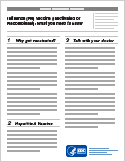VIS inactivada contra la influenza
Current Edition Date: 8/6/2021
- Print VIS [2 páginas]
- RTF file [3 páginas]
(For use in electronic systems) - VIS in other languages
- Más información acerca de la vacuna contra la influenza
- See note about this VIS
Influenza vaccine can prevent influenza (flu).
Flu is a contagious disease that spreads around the United States every year, usually between October and May. Anyone can get the flu, but it is more dangerous for some people. Infants and young children, people 65 years and older, pregnant people, and people with certain health conditions or a weakened immune system are at greatest risk of flu complications.
Pneumonia, bronchitis, sinus infections, and ear infections are examples of flu-related complications. If you have a medical condition, such as heart disease, cancer, or diabetes, flu can make it worse.
Flu can cause fever and chills, sore throat, muscle aches, fatigue, cough, headache, and runny or stuffy nose. Algunas personas pueden tener vómitos y diarrea, aunque esto es más común en los niños que en los adultos.
In an average year, thousands of people in the United States die from flu, and many more are hospitalized. Flu vaccine prevents millions of illnesses and flu-related visits to the doctor each year.
CDC recommends everyone 6 months and older get vaccinated every flu season. Children 6 months through 8 years of age may need 2 doses during a single flu season. Everyone else needs only 1 dose each flu season.
It takes about 2 weeks for protection to develop after vaccination.
Existen muchos virus de la influenza y cambian constantemente. Each year a new flu vaccine is made to protect against the influenza viruses believed to be likely to cause disease in the upcoming flu season. Incluso cuando la vacuna no se corresponde con estos virus con exactitud, igual puede brindar algún tipo de protección.
La vacuna contra la influenza no causa la influenza.
La vacuna contra la influenza puede ser administrada al mismo tiempo que otras vacunas.
Tell your vaccination provider if the person getting the vaccine:
- Has had an allergic reaction after a previous dose of influenza vaccine, or has any severe, life-threatening allergies
- Has ever had Guillain-Barré Syndrome (also called “GBS”)
In some cases, your health care provider may decide to postpone influenza vaccination until a future visit.
La vacuna contra la influenza puede administrarse en cualquier etapa del embarazo. People who are or will be pregnant during influenza season should receive inactivated influenza vaccine.
Las personas con enfermedades menores, como un resfriado, pueden vacunarse. Por lo general, las personas con una enfermedad moderada o grave deberían esperar hasta su recuperación para recibir la vacuna contra la influenza.
Su proveedor de atención médica puede brindarle más información.
- Soreness, redness, and swelling where the shot is given, fever, muscle aches, and headache can happen after influenza vaccination.
- There may be a very small increased risk of Guillain-Barré Syndrome (GBS) after inactivated influenza vaccine (the flu shot).
Young children who get the flu shot along with pneumococcal vaccine (PCV13) and/or DTaP vaccine at the same time might be slightly more likely to have a seizure caused by fever. Tell your health care provider if a child who is getting flu vaccine has ever had a seizure.
Algunas personas suelen desmayarse tras un procedimiento médico, como es el caso de la vacunación. Avísele a su proveedor si tiene mareos, visión borrosa o zumbidos en el oído.
Como con cualquier medicamento, existe una posibilidad muy remota de que una vacuna cause una reacción alérgica severa, alguna otra lesión grave o incluso la muerte.
An allergic reaction could occur after the vaccinated person leaves the clinic. If you see signs of a severe allergic reaction (hives, swelling of the face and throat, difficulty breathing, a fast heartbeat, dizziness, or weakness), call 9-1-1 and get the person to the nearest hospital.
For other signs that concern you, call your health care provider.
Adverse reactions should be reported to the Vaccine Adverse Event Reporting System (VAERS). Your health care provider will usually file this report, or you can do it yourself. Visite las páginas de sitio web de VAERS o llame al 1-800-822-7967. VAERS is only for reporting reactions, and VAERS staff members do not give medical advice.
El Programa nacional de compensación por lesiones causadas por vacunas (VICP) es un programa federal que fue creado con la finalidad de compensar a las personas que quizás sufrieron lesiones a causa de ciertas vacunas. Claims regarding alleged injury or death due to vaccination have a time limit for filing, which may be as short as two years. Visite las páginas de VICP website or call 1-800-338-2382 to learn about the program and about filing a claim.
- Ask your health care provider.
- Llame a la departamento de salud local o estatal.
- Visit the website of the Administración de Alimentos y Medicamentos (FDA) for vaccine package inserts and additional information.
- Contact the Centers for Disease Control and Prevention (CDC):
- Llame al 1-800-232-4636 (1-800-CDC-INFO) or
- Visite el sitio web de los CDC sobre la influenza
Many vaccine information statements are available in Spanish and other languages. Vea www.immunize.org/vis
Hojas de información sobre vacunas están disponibles en español y en muchos otros idiomas. Visite www.immunize.org/vis
Vaccine Information Statement (Interim)
Inactivated Influenza Vaccine (8/6/21)
42 U.S.C. §300aa-26
Departamento de Salud y Servicios Humanos
Centros para el Control y la Prevención de Enfermedades
Office Use Only

